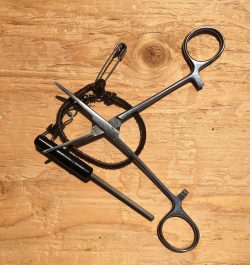 Forceps and hook sharpeners are two important tools that will save fish. Both tools help to save fish lives. If you plan to catch and release successfully, you will need both.
Forceps and hook sharpeners are two important tools that will save fish. Both tools help to save fish lives. If you plan to catch and release successfully, you will need both.
The other day on the Madison River, I saw a guided client land a great brown trout. This 20-inch fish ate a hopper pattern. The fight lasted 8-10 minutes. The inexperienced angler could not reel in the fish. The guide finally exited the boat and went downstream below the fish and netted him 20 yards downstream. Once in the net, the guide and angler took pictures of the exhausted trout for 10 more minutes. Finally, after 20 minutes, the tired trout was released. He bellied up for a moment but was able to slowly return to the deeper and slower water. The stress from the battle, loss of oxygen, muscle soreness, and loss of skin mucus meant eventual death. What a waste!
Once a fish is hooked, the clock is running. Stress to the fish begins with the fish fighting for its life. The pulling, jumping, and tugging means energy is being used and muscles are being strained. As the muscles work, lactic acid is building up. Eventually, this will damage the fish.
Once out of the water, the fish will suffocate. How long can you hold your breath? Maybe a couple minutes, with practice and 2 healthy lungs. Fish have gills and no lungs to store air. Their time is even less.
Forceps allow the fisherman to remove the hook quickly and with minimal damage. If the forceps do not work, cut the line. A fish’s digestive juice swill dissolve the hook within 3 days.
The hook sharpener will increase your hook up three-fold. Sharper hooks hook solid and better than dull ones. The barb helps to create a larger hole for the hook to back out. This means unhooking from the cartilage of a fish’s mouth is quicker. If the fish has the hook deep down its throat, cut the line and if necessary cut the hook. If the fish is bleeding, it will most likely die.
If you plan to keep the fish, kill it immediately. A quick “thunk” to the head, with a Billy Club, or break of the neck, or bleeding the fish will do the trick. You do not want a flopping fish on a stringer or in a cooler. As they flop, lactic acid is building up and changing the flavor of your fish. Place the fish quickly on ice for proper processing later. Once processed and cleaned, the fish will taste best fresh. Frozen fish will be good for about 3 months.
A rubber net works best. Any net must be wet before using. Wiping off the fish’s protective mucous coating is like ripping off its skin protection. Don’t use cloth or towels to handle a fish for release. Dropping the fish into the boat, sand, or rocks, only adds to the death wish.
Plan pictures ahead of time. Know what you want and keep the fish in the net and water until ready. Cradle the fish gently, with wet hands. Don’t hold him to your shirt. Squeezing can rupture air bladders and other organs. Be gentle and quick. Once the fish is placed back in the water, hold him facing the current. Allow them to catch their breath. They will swim from your hands when able.
Save a fish!
Montana Grant
For more Montana Grant, Catch and Release him at www.montanagrantfishing.com